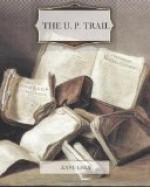A dull sound puffed up from the gorge, a low crash, then a slow-rising roar and rattle of sliding earth and rock. It diminished and ceased with the hollow cracking of stone against stone.
Casey broke the silence among the listening men with a curse. Larry Red King rose from his knees, holding the end of the snapped rope, which he threw from him with passionate violence. Then with action just as violent he unbuckled his belt and pulled it tighter and buckled it again. His eyes were blazing with blue lightning; they seemed to accuse the agitated engineers of deliberate murder. But he turned away without speaking and hurried along the edge of the gorge, evidently searching for a place to go down.
General Lodge ordered the troopers to follow King and if possible recover Neale’s body.
“That lad had a future,” said old Henney, sadly. “We’ll miss him.”
Boone’s face expressed sickness and horror.
Baxter choked. “Too bad!” he murmured, “but what’s to be done?”
The chief engineer looked away down the shadowy gorge where the sun was burning the ramparts red. To have command of men was hard, bitter. Death stalked with his orders. He foresaw that the building of this railroad was to resemble the war in which he had sent so many lads and men to bloody graves.
The engineers descended the long slope and returned to camp, a mile down the narrow valley. Fires were blazing; columns of smoke were curling aloft; the merry song and reckless laugh of soldiers were ringing out, so clear in the still air; horses were neighing and stamping.
Colonel Dillon reported to General Lodge that one of the scouts had sighted a large band of Sioux Indians encamped in a valley not far distant. This tribe had gone on the war-path and had begun to harass the engineers. Neale’s tragic fate was forgotten in the apprehension of what might happen when the Sioux discovered the significance of that surveying expedition.
“The Sioux could make the building of the U. P. impossible,” said Henney, always nervous and pessimistic.
“No Indians—nothing can stop us!” declared his chief.
The troopers sent to follow Larry King came back to camp, saying that they had lost him and that they could not find any place where it was possible to get down into that gorge.
In the morning Larry King had not returned.
Detachments of troopers were sent in different directions to try again. And the engineers went out once more to attack their problem. Success did not attend the efforts of either party, and at sunset, when all had wearily returned to camp, Larry King was still absent. Then he was given up for lost.
But before dark the tall cowboy limped into camp, dusty and torn, carrying Neale’s long tripod and surveying instrument. It looked the worse for a fall, but apparently was not badly damaged. King did not give the troopers any satisfaction. Limping on to the tents of the engineers, he set down the instrument and called. Boone was the first to come out, and his summons brought Henney, Baxter, and the younger members of the corps. General Lodge, sitting at his campfire some rods away, and bending over his drawings, did not see King’s arrival.




